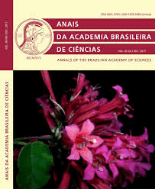
ANAIS DA ACADEMIA BRASILEIRA DE CIENCIAS
Scope & Guideline
Advancing Scientific Frontiers, One Article at a Time.
Introduction
Aims and Scopes
- Biodiversity and Conservation:
Research focused on the diversity of flora and fauna, conservation strategies, and the ecological impacts of human activities in various Brazilian biomes. - Health Sciences:
Studies addressing health-related topics, including epidemiology, public health, and the impacts of diseases, such as COVID-19, on various populations. - Agricultural and Environmental Sciences:
Exploration of agricultural practices, soil health, and the interactions between agricultural systems and the environment, including sustainable practices. - Microbiology and Biotechnology:
Research on microorganisms, their biotechnological applications, and interactions with their environments, focusing on the development of novel biopesticides and probiotics. - Ecological and Evolutionary Studies:
Investigations into the ecological interactions and evolutionary processes affecting species in diverse ecosystems, particularly within the context of climate change. - Chemistry and Material Science:
Studies on chemical properties, synthesis of new compounds, and their potential applications in health, agriculture, and industry.
Trending and Emerging
- Climate Change Impacts:
Increasing research addressing the effects of climate change on biodiversity, ecosystems, and human health, highlighting the urgency of this global issue. - Artificial Intelligence and Machine Learning Applications:
A rising trend in the application of AI and machine learning techniques across various fields, including environmental monitoring, health diagnostics, and agricultural assessments. - Sustainable Practices in Agriculture and Industry:
Growing emphasis on sustainability, including studies on eco-friendly agricultural practices, waste management, and the development of biodegradable materials. - Health and Disease Dynamics in Populations:
An increased focus on health-related studies, particularly those examining the dynamics of diseases like COVID-19, and their socio-environmental impacts. - Microbial Ecology and Biotechnology:
Emerging interest in the role of microbes in ecosystems, their potential for biotechnological applications, and their interactions with environmental factors.
Declining or Waning
- Paleontology:
Research related to paleontological studies has become less frequent, possibly due to shifting interests towards contemporary ecological and environmental issues. - Geological and Geophysical Studies:
The number of articles focused on geological surveys and geophysical research appears to be declining as the journal shifts towards more applied and ecological research themes. - Traditional Agricultural Practices:
There has been a noticeable decrease in articles discussing traditional agricultural practices, as there is a growing emphasis on modern, sustainable agricultural techniques and technologies. - Invasive Species Management:
Although still relevant, studies specifically targeting invasive species management are less common, potentially reflecting a broader focus on ecosystem health rather than individual species.
Similar Journals
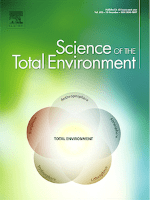
Science of The Total Environment
Pioneering Insights in Environmental ScienceScience of The Total Environment, an esteemed journal published by Elsevier, holds a significant position in the field of environmental science, encompassing critical areas such as Environmental Chemistry, Environmental Engineering, Pollution, and Waste Management and Disposal. With an impressive impact factor and ranked in the Q1 quartile across its categories for 2023, the journal is recognized for its high-quality research output and contribution to environmental sustainability. Operating from its base in the Netherlands, the journal has been a valuable resource since its inception in 1972, welcoming innovative studies that address complex environmental challenges. Its notable rankings—such as Rank #9 in both Environmental Sciences and Pollution—underscore its relevance and influence in the academic community. Although the journal currently does not provide an open access option, the robust findings and discussions presented within its pages continue to foster a deeper understanding of environmental issues. Science of The Total Environment is an essential platform for researchers, professionals, and students dedicated to advancing knowledge and solutions in the rapidly evolving field of environmental science.

Bioscience Journal
Connecting minds, cultivating knowledge in biosciences.Bioscience Journal is a premier open-access publication dedicated to advancing research in the field of agricultural and biological sciences. Published by the Universidade Federal de Uberlândia, this journal has been a vital resource for the academic community since its transition to open access in 2001. With the ISSN 1981-3163, it serves as an essential platform for disseminating innovative research findings and methodologies that contribute to the sustainable development of biological resources. As of 2023, it has been categorized in the Q4 quartile in Agricultural and Biological Sciences (miscellaneous) and ranks 152 out of 221 in Scopus, placing it in the 31st percentile. The journal's scope encompasses a wide array of topics that stimulate interdisciplinary discourse and collaboration among researchers, professionals, and students alike. With engaging content and a commitment to accessibility, Bioscience Journal plays a crucial role in fostering scholarly communication and enriching the academic landscape in Brazil and beyond.

APPLIED ECOLOGY AND ENVIRONMENTAL RESEARCH
Fostering dialogue and collaboration in applied ecological research.Applied Ecology and Environmental Research is a distinguished journal published by ALOKI Applied Ecological Research and Forensic Inst Ltd, located in Hungary. Since its inception in 2003, the journal has provided a pivotal platform for the dissemination of innovative research and discussions pertaining to applied ecology and its intersection with environmental sciences. With its ISSN 1589-1623 and E-ISSN 1785-0037, the journal boasts a respectable presence, achieving a Q3 ranking in Agronomy and Crop Science and a Q4 ranking in Ecology, Evolution, Behavior, and Systematics as of 2023. This reflects its commitment to publishing high-quality research that is vital for advancing knowledge in these fields. While it primarily operates under a subscription model, authors and institutions are encouraged to contribute meaningful research that sparks dialogue and fosters collaboration among a diverse range of stakeholders in ecological research. Researchers, professionals, and students alike will find valuable insights and contributions that address contemporary environmental challenges and promote sustainability. Join the community of scholars who are shaping the future of ecology and environmental research through this impactful publication.

Iranian Journal of Science
Bridging Scientific Frontiers with Open AccessThe Iranian Journal of Science, published by Springer International Publishing AG, serves as a vital platform for researchers and professionals across a broad spectrum of scientific disciplines. With its focus on general chemistry, agricultural and biological sciences, earth and planetary sciences, mathematics, and physics and astronomy, this journal provides an open-access outlet for innovative and groundbreaking research, facilitating knowledge sharing in the scientific community. Despite its recent establishment from 2023, it is building a reputation for academic rigor, as evidenced by its current Scopus rankings, which position it within the lower percentiles of its field. Researchers interested in interdisciplinary studies will find it increasingly relevant as it aims to enhance scientific discourse across traditional boundaries. Operating out of Germany, this journal seeks to contribute significantly to science by publishing quality research, reinforcing its objective of fostering a collaborative academic environment. As the journal continues to grow, it is poised to become a critical resource for scholars, students, and professionals alike.
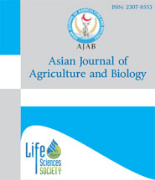
Asian Journal of Agriculture and Biology
Fostering knowledge in agriculture and biology for a better tomorrow.Welcome to the Asian Journal of Agriculture and Biology, a premier open access journal published by LIFE SCIENCES SOC PAKISTAN, dedicated to advancing research in the fields of agricultural and biological sciences. Since its inception in 2013, this journal has provided a vital platform for scholars and practitioners to disseminate novel findings and innovative methodologies that contribute to the betterment of agricultural practices and biological research. With an impressive H-Index and ranked in the Q3 category across multiple disciplines including Agricultural and Biological Sciences, Biochemistry, Genetics, and Molecular Biology, as well as Medicine, the journal showcases high-quality research that influences both academic and practical applications globally. The journal is indexed in Scopus, reinforcing its commitment to high academic standards and providing researchers with efficient access to significant knowledge. Based in Pakistan, the Asian Journal of Agriculture and Biology is your gateway to staying abreast of the latest trends and discoveries that support sustainable development and health sciences.
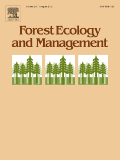
FOREST ECOLOGY AND MANAGEMENT
Pioneering Research for Forest ConservationFOREST ECOLOGY AND MANAGEMENT is a premier peer-reviewed journal dedicated to the integral study of forest ecosystems and their management, published by Elsevier in the Netherlands. With an impactful presence in the field, this journal boasts a prestigious Q1 ranking in multiple categories, including Forestry, Management, Monitoring, Policy and Law, and Nature and Landscape Conservation as of 2023. It addresses key issues relevant to sustainable forest practices, conservation strategies, and environmental monitoring, making it a vital resource for researchers, practitioners, and policymakers alike. The journal is indexed with an impressive Scopus rank, placing it among the top tier of titles in Agricultural and Biological Sciences and Environmental Science. While it does not offer Open Access options, its rigorous review process and high visibility make it essential for those seeking to stay abreast of the latest findings and trends in forest ecology and management. Published continuously since 1976, FOREST ECOLOGY AND MANAGEMENT aims to foster interdisciplinary collaboration and advance knowledge critical to the stewardship of forest resources in an ever-changing global landscape.
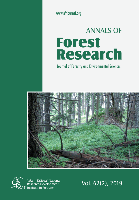
Annals of Forest Research
Connecting scholars to foster environmental stewardship.Annals of Forest Research is a peer-reviewed journal dedicated to advancing knowledge in the fields of forestry, ecology, and plant sciences. Published by EDITURA SILVICA in Romania, this journal has been an open access publication since 2008, providing a platform for researchers to share their insights and findings with a global audience. The journal operates under a rigorous selection process, reflected in its positioning within the Q2 category in Forestry and Q3 in both Ecology and Plant Science as of 2023. With Scopus rankings indicating a solid percentile among its peers, Annals of Forest Research continues to play a vital role in disseminating innovative research and fostering scholarly dialogue. Researchers, professionals, and students are encouraged to explore its diverse range of articles, which address both foundational and contemporary issues in forest management and environmental sustainability, contributing to the sustainable use and preservation of forest ecosystems.

Science Diliman
Advancing Knowledge Across DisciplinesScience Diliman is a distinguished open access academic journal published by the University of the Philippines Diliman, focusing on a wide array of scientific disciplines, including natural sciences, social sciences, and engineering. Established in 1980, this journal has embraced the principles of open access publishing, providing researchers and the academic community with free and unrestricted access to its high-quality articles. With a commitment to advancing knowledge and fostering intellectual discourse, Science Diliman serves as a vital platform for researchers, professionals, and students alike, facilitating the exchange of innovative ideas and groundbreaking research findings. By maintaining high editorial standards and engaging with contemporary issues, this journal plays an essential role in shaping the scientific landscape in the Philippines and beyond. For more information, visit the journal's website to explore its latest publications and contributions to the scientific community.

CienciaUat
Unlocking the potential of science through open access.CienciaUat is a distinguished academic journal published by the Universidad Autónoma de Tamaulipas, dedicated to fostering innovative research across various scientific disciplines. With an ISSN of 2007-7521 and an E-ISSN of 2007-7858, this journal serves as a platform for the dissemination of high-quality research findings that contribute to the advancement of science and technology within both local and international contexts. The journal aims to promote scholarly communication among researchers, professionals, and students, emphasizing the importance of empirical evidence and interdisciplinary approaches. Though specific metrics like H-Index and Scopus rankings are currently not provided, CienciaUat is committed to maintaining rigorous peer-review standards. The journal’s open-access model facilitates wide accessibility, ensuring that pivotal research reaches a global audience. The editorial team encourages submissions that adhere to the highest academic standards, reflecting innovation and relevance in today’s scientific landscape.

Revista Brasileira de Ciencias Ambientais
Bridging Theory and Practice in Environmental ScienceRevista Brasileira de Ciências Ambientais (ISSN: 1808-4524, E-ISSN: 2176-9478) is a prestigious open-access journal published by the Associação Brasileira de Engenharia Sanitária e Ambiental. Since its inception in 2005, this journal has played a vital role in disseminating innovative research and practical insights in the field of environmental sciences, focusing on both theoretical and applied aspects affecting Brazil and beyond. With a commitment to fostering knowledge exchange among researchers, policymakers, and practitioners, it addresses crucial topics such as environmental management, sustainability, and public health. The journal is housed in Rio de Janeiro, Brazil, and although specific metrics like H-Index or category quartiles are currently unavailable, its open-access model ensures wide visibility and accessibility, catering to a diverse audience of professionals and students passionate about protecting and enhancing our environmental systems.